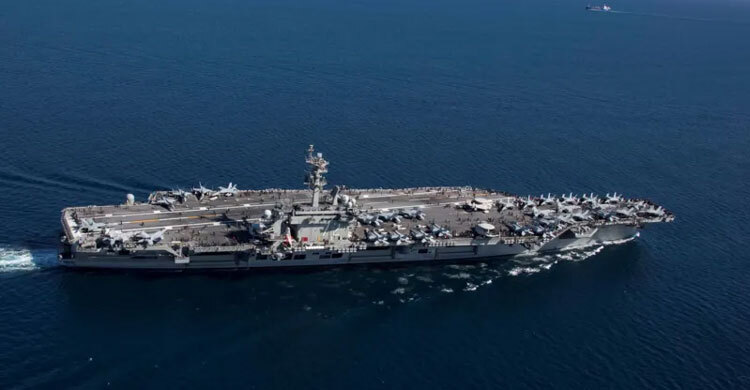US sends guided missile submarine to Middle East as tensions grow

The US has sent a guided missile submarine to the Middle East, as tensions grow in the region.
Defence Secretary Lloyd Austin also said an aircraft carrier which was already heading to the area would sail there more quickly.
The move comes in response to fears of a wider regional conflict, after the recent assassination of senior Hezbollah and Hamas leaders, reports BBC.
It signals the US's determination to help defend Israel from any attack by Iran - with Austin saying US would "take every possible step" to defend its ally.
Iran is being closely watched for any indication of how and when it might respond to the assassination of Hamas's top political leader Ismail Haniyeh in Tehran on 31 July.
The Iranians blamed Israel for the assassination of Haniyeh on their soil, and have vowed to punish it. Israel has not commented but is widely believed to have been behind it.
In a statement on Sunday, the Pentagon said Austin had sent the USS Georgia guided missile submarine to the region.
It had also ordered the USS Abraham Lincoln carrier strike group, which is carrying F-35C fighter jets, to accelerate its journey there. The ship was already on its way to replace another US ship in the region.
It remains unclear what Iran could be planning to do.
Meanwhile, another possible attack on Israel could come from Hezbollah, the Iranian-backed militia and political movement in Lebanon.
The group has vowed to respond to the killing by Israel of senior commander Fuad Shukr, which happened just hours before Haniyeh’s assassination, in Beirut’s southern suburbs.
The Biden administration believes a ceasefire in Gaza that frees Israeli hostages would be the best way to calm tensions in the region, and has called for talks to resume on Thursday.
But on Sunday night, Hamas responded to US efforts to revive the ceasefire talks by saying Israel should be forced to implement the deal already on the table.
Hamas said that any resumption of ceasefire talks about the conflict in Gaza should be based on previous plans rather than holding new rounds of negotiations.
However its statement indicated an agreement in principle to participate.
Washington has previously blamed Hamas for the failure of negotiations.
But Israeli press reports say the US increasingly sees Israel’s Prime Minister Benjamin Netanyahu as partly responsible - because he is accused of appeasing far-right members of his coalition who are opposed to a deal.
Last week, for the first time the White House openly criticised one of these coalition leaders, finance minister Bezalel Smotrich.
Smotrich had urged Israel to reject the US push for ceasefire talks, saying it would be a surrender to Hamas. White House national security spokesman John Kirby said Smotrich was "dead wrong" and accused him of making false claims.
Meanwhile the leaders of the UK, France and Germany echoed calls for ceasefire talks to resume.
"We agree that there can be no further delay," said the statement from UK Prime Minister Sir Keir Starmer, French President Emmanuel Macron and German Chancellor Olaf Scholz.
"We have been working with all parties to prevent escalation and will spare no effort to reduce tensions and find a path to stability."





